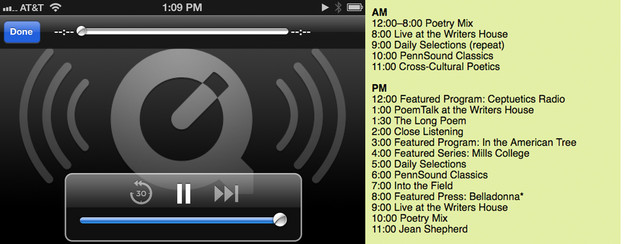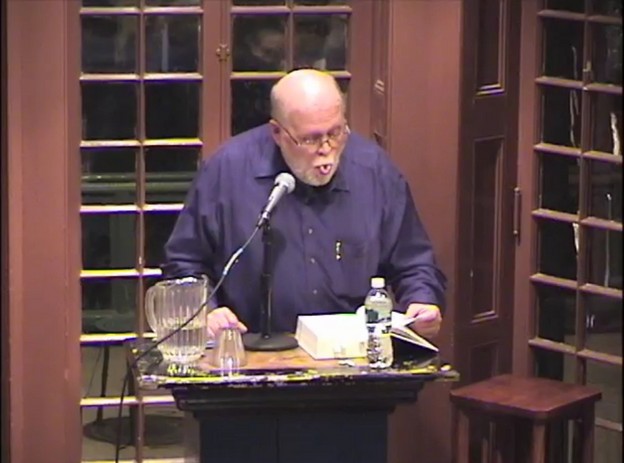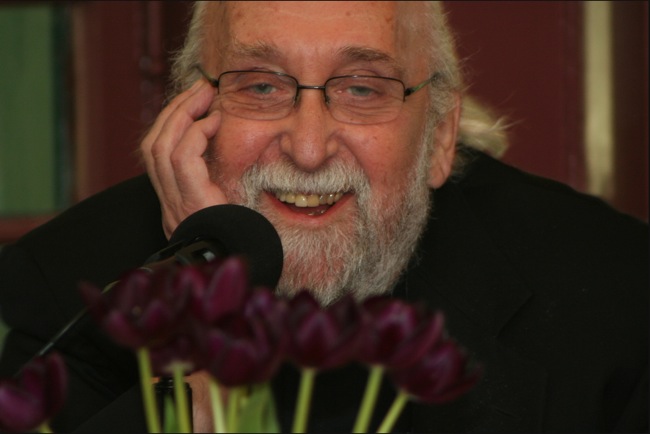|
|
Posted 12/5/2011 (link)
 We start the week off with a new PennSound & Politics commentary from Brian Ang: Charles Bernstein, Rachel Blau DuPlessis, 2005, which focuses on the latter poet's appearance on a two part Close Listening program in April of that year.
DuPlessis reads a broad selection of poems from the Drafts project — from recent pieces like "Draft 61: Pyx," "Draft 63: Dialogue of Self & Soul" and "Draft 64: Forward Slash" to earlier works including "Draft 20: Incipit" and "Draft 25: Segno" — and begins the conversation segment by "describing Drafts' formal motivations stemming from 'my impatience with the lyric, my resistance to the short contained poem... [having] something to do with gender issues and something with the iconic poem for gender; the short poem often is invested in female figures.... Drafts are like many modernist long poems... [that collect] almost an encyclopedic array [of sources]... and I repeat that gesture because of an encyclopedic urge.'" Ang continues, "She acknowledges Drafts' formal decision of adding notes as historically being the gesture of The Waste Land, but specifies Marianne Moore's practice of citation as 'much more to my taste, she simply says that she cites because people said things and you can't possibly say them better, you can't possibly paraphrase them. So the gesture is in her case democratizing. In Eliot's case it seems to close off and make arcane the move to write a long poem.'"
After addressing issues of political grief and agency, aesthetic citizenship and gender considerations, Ang concludes by observing "Drafts as a work of exemplary dynamic thought patiently composed through a long duration of changing political conditions implicitly argues for its continued dynamism of thought in the changing political conditions ahead, or at least enables a lengthy historical perspective for reflecting on the relation between poems and changing political conditions. As DuPlessis' aesthetics are augmented by a political ethics to 'act in a civic manner,; the political paradigm shift of the referent of United States protest from Iraq to an alignment with the civic space itself necessitates renewing this model;s particularity for the present."
You can read that and all of Brian's other "PennSound and Politics" commentaries on Jacket2, and stay tuned for his next post, which will focus on Ron Silliman's 2009 reading from The Alphabet at the Kelly Writers House.
Posted 12/14/2011 (link)
 Today is a milestone birthday for one of our favorite poets (and favorite people), Rachel Blau DuPlessis, and we're celebrating with a treasure trove of new material at both PennSound and Jacket2
First up, we have a new Studio 111 Session that I recorded last December while in town for Poetry in 1960 &mdash: a Symposium. Running more than an hour, this set includes nine poems: five from her most-recent collection, Pitch: Drafts 77-95 and four newer pieces ("Draft 96: Velocity," "Draft 98: Canzone," "Draft 99: Intransitive" and "Draft 104: the Book"). Rachel is, without a doubt, one of my favorite people to record, not just because she understands the process and always turns in an astounding performance — projecting an intimacy and warmth that makes one feel as if they were actually there in the same room at a private reading — but also for the conversation that fills the space between takes. This time around, Rachel, Jeff Boruszak (who assisted with the recording) and were having so good a time that we had to keep reminding ourselves that there was work to be done (and should future generations of DuPlessis scholars be interested, I've kept the tapes).
Of course, it was painful to keep this wonderful session under wraps for a year, but the reason we did so was because it was intended as a complement to "Drafting Beyond the Ending," Patrick Pritchett's exhaustive feature on DuPlessis and her life's work, which we're very proud to unveil today. The feature brings together work from sixteen contributors, including Ron Silliman, Bob Perelman, Thomas Devaney, Chris Tysh, Alan Golding, Catherine Taylor, Libbie Rifkin and more, as well as a new poem from DuPlessis, "Draft 109: Wall Newspaper". This massive undertaking, many months in the making, is a fitting tribute to Rachel's considerable talents, and a fantastic birthday present to boot. You can click the title above to listen to the new recordings, and head over to Jacket2 to start reading.
Posted 12/16/2011 (link)
 Today we're pleased to announce the launch of PennSound Radio, a 24-hour stream of readings and conversations from the PennSound poetry archive. Our daily schedule includes rebroadcasts of such series as Live at the Writers House, Charles Bernstein's Close Listening, and Leonard Schwartz's Cross-Cultural Poetics, as well as a curated selection of our favorite performances. You can play PennSound Radio through iTunes on your computer, or by installing the free TuneIn app on your iPhone, BlackBerry, or Android device. Listen at work! At home! At the gym! While rebuilding a transmission! And while you're at it, follow us on Twitter (@PennSoundRadio) to keep up with all of our new programs and special features.
Posted 12/19/2011 (link)
 We wanted to draw your attention to Brian Ang's latest PennSound & Politics commentary, over at Jacket2, which focuses on a 2009 celebration of Ron Silliman's The Alphabet at our own Kelly Writers House.
After parsing through the evening's "deluxe set of introductions" — by Jessica Lowenthal, Rachel Blau DuPlessis, Charles Bernstein and Bob Perelman — that establish the contexts for The Alphabet and offer appraisals of its scope and technique, Ang makes his way through Silliman's set, which begins, appropriately enough, with a pair of firsts: "Albany" (the first poem in the book) and "Force" (the first poem written for the book). From there, Silliman moves on excerpts, first from from "Non" ("In Gargoyle 32/33, Dan Beaver writes...,"), "Paradise" (first section and last two sections) and "VOG" ("For Larry Eigner, Silent"). Here's Ang's discussion of the final selection: Silliman concludes with "For Larry Eigner, Silent" from "VOG," "an attempt to actually write a series of 'normal poems,'" and "note[s] that Larry did not learn to speak... until he was in his thirties, even though he was publishing books before then and even though the books he was publishing align him with people like Robert Creeley and Charles Olson and Robert Duncan, for whom, you know, the text on the page was a score for speech. He was writing these scores for speech in fact before he had some surgery that allowed him to participate." The second line of the poem, "The poem is a field of action," is an allusion to William Carlos Williams' essay "The Poem as a Field of Action" (1948), but operates as an allusion in a tighter production of meaning in the poem's specificity of details about Eigner than how allusions operate more antically in the oceanic assembly line of "Paradise." Williams' "The Poem as a Field of Action" is another iteration of his frequent polemics against tradition, represented here by T.S. Eliot and W.H. Auden, with the prescription for a new measure, symptomatically speech-normative in its argumentation but before speech was overtly valorized in "Projective Verse." Drawing these gestures into relation with the biography and work of Eigner recuperates these gestures consonantly with Silliman's poetics challenging tradition and speech-centered poetics. The poem closes with a quote, "Oh yeah / you're // one of the ones // who can write in the dark," which also appears attributed to Eigner in Tjanting. Silliman's selection of this poem in the Alphabet reading corresponds to the importance of Eigner in Silliman's work, such as the dedication to Eigner in In the American Tree. The commentary concludes with an analysis of Silliman's process of choosing the evening's readings, working within the constraints of a 48-minute set, and offers up "a reading of equal length with different selections ... understood to be a complement to this one," along with an invitation for "Silliman to provide reflections about new selections from the Alphabet as valuable illuminations to the work, and also invite readers to reflect on selections on their own platforms."
Stay tuned for Ang's next commentary, addressing the four episodes of Short Range Poetic Device — an internet program hosted by Stephen Collis and Roger Farr as part of Vivo Media Arts' "Safe Assembly" project protesting the 2010 Winter Olympics in Vancouver, BC — which promises to be a truly fascinating piece of criticism. You can read that and all of his other "PennSound and Politics" commentaries on Jacket2
Posted 12/19/2011 (link)
 Earlies this week, we released the forty-eigth episode in the PoemTalk Podcast Series. Here's host Al Filreis' write-up of the new show from the PoemTalk blog on Jacket2:
Read Edgar Allan Poe's "Dream-Land" even just once and discover that it's not at all clear if this land of dreams is the place from which the speaker has come, or is, rather, his longed-for destination — or if indeed it is the very mode and means and route endured along the way. Subject and object, both; content and form likewise; it is the process that demonstrates the importance of desired ends. "Thule," a northerly, arctic/Scandinavian sort of zone, is apparently an origin "from" which the speaker has traveled, but it is also apparently "it" — a "wild clime" neither geographical nor temporal, "Out of SPACE— out of TIME." And "it" is also a space through which one passes.
Thomas Devaney, John Timpane, and Jerome McGann greatly admire what Poe achieved here. For them it is a matter of a sort of wild control. The poem seems to go where it will (and that's its point) but the speed — as matter of tongue, teeth and lips saying its words — is managed at the level of the line. The poem is intensely languaged, as is the selfhood of the "I" whose journey is always already the poem. And so this work, as an act of writing, far transcends its Gothic conventions.
Jerry McGann visited the Kelly Writers House to give a talk on Poe, decentered culture and critical method, and also to record a session of "Close Listening." We at PoemTalk took advantage of his proximity to our studios, as well as of Philadelphia's Poe-centricity, and (unusually for PoemTalk) gave our fair city's visitor his choice of which Poe poem to feature. He selected — as he explains briefly during our talk — a typical but less well-known piece. Emerging from the urban corners of the Poe-known world were John Timpane of the Philadelphia Inquirer, where poetry actually continues to have something of a foothold among daily journalism, and, from further south and west, Tom Devaney, who ventured in from Haverford College where he teaches his share of Poe along with a great deal else. It should be noted here that Tom wasn't always at the bucolic edge of William Penn's town. In 2004, for instance, he spent several afternoons at the Edgar Allan Poe National Historic Site (Poe's house, in other words) performing "The Empty House Tour" as part of the ICA's series called "The Big Nothing."
Of course we have no recordings of Poe reading this poem, and we're not even certain he ever performed it in public, although Jerry and Tom assure us that Poe did give readings and was even, for a time, avid about it. PoemTalk's featured poems are always drawn from PennSound's vast archive, but in this case, fortunately, we were able to make use of PennSound Classics, a page featuring links to guest performances of Blake, Chaucer, Wyatt, Spencer, Homer, Sappho, Langland, Milton, Pope, Swift, Dryden, Shakespeare, Whitman, Wordsworth, Coleridge, and Keats, as well as from among archaic Greek poems and Scottish ballads. "Classics" also include Poe, as selected and performed by our own Jerome McGann. Here is his recording of "Dream-Land."
Our director and engineer for this show was James LaMarre, and our editor this time, and indeed for all 48 shows, has been Steve McLaughlin. We note with pride that Steve is now also the Director of PennSound Radio. If you tune in you will occasionally hear Steve's voice announcing the playlist, but know, in any case, that he's the DJ behind the selections.
PoemTalk is a co-production of PennSound, the Kelly Writers House, Jacket2 and the Poetry Foundation. If you're interested in more information on the series or want to hear our archives of previous episodes, please visit the PoemTalk blog, and don't forget that you can subscribe to the series through the iTunes music store. Thanks, as always, for listening!
Posted 12/22/2011 (link)
 Today, we're proud to unveil a new recording from the inimitable Jerry Rothenberg, along with complementary content on Jacket2.
Recorded April 13, 2011 at Xavier University in Cincinnati, Rothenberg's reading was held in a celebration of the college's new Jewish Studies minor in collaboration with Hebrew Union College, featuring introductory comments from noted poet, scholar and XU professor Norman Finkelstein and HUC dean Rabbi Ken Ehrlich. Fittingly, Rothenberg's career-spanning set focused on Jewish identity, drawing primarily from the three diverse volumes collected in Triptych (2007) — Poland/1931 (1974), Khurbn & Other Poems (1989) and The Burning Babe (2007) — with excursions into A Big Jewish Book: Poems & Other Visions of the Jews from Tribal Times to the Present (1977), Gematria (1993) and "A Book of Concealments" from his latest collection, Concealments & Caprichos (2010).
These texts and ideas were also a central part of Rothenberg's 2008 visit to UPenn as a Kelly Writers House Fellow — both his Monday evening reading and the following day's discussion with Al Filreis — and today on Jacket2, we've posted Katie L. Price's transcription of the latter event, which also features audience questions and conversations from CAConrad, Bob Perelman, Thomas Devaney, Lee Ann Brown, Robert Sward and Murat Nemat-Nejat, among others.
You can listen to the new Xavier recording here, while segmented audio from both KWH Fellows events can be found here and the Jacket2 transcript is here.
Posted 12/28/2011 (link)
 One of my favorite ongoing series, and one that we're honored to be able to share with PennSound's listeners, is the Threads Talk Series: Steve Clay and Kyle Schlesinger's NYC-based collection of lectures, performances and conversations "devoted to the art of the book," which seeks "to build on the discourse within book arts to explore and enrich relationships between various strands of book culture that are often approached in isolation," such as "poetry and writing, visual and performing arts, collaboration, design, printing, independent publishing, literary history, critical theory, and material culture to name a few."
While the eventual destination of these talks is a volume published by Granary Books, it's fascinating to be able to see that collection come together in real-time and hear the discussions that will shape the finalized versions of these essays. Today, we're highlighting the two latest additions from this past fall.
First up is a November 20th talk by artist, author and bookmaker, Keith Smith, entitled "Struggling to See." "Like every artist," he begins, "I was born blind. It was not easy learning to see. It is still a struggle, constantly." Smith's talk begins with the simple childhood joy of drawing and its role as a language in and of itself, hindering his speech development, and his imaginative evolution after his parents closed that avenue to him.
We also have bookbinding scholar and book artists, Richard Minsky's December 3rd talk, "Material Meets Metaphor,", which starts with his formative childhood experiences with printing — starting at ten with a Superior Cub Rotary Press, soon followed by Kelsey Platen Press, allowing him, at the age of thirteen, to start his own printing business — then jumping to his collegiate experiences (at Brown and the New School) with economics, aesthetics and material culture.
You can listen to previous events featuring Alan Loney, Charles Alexander, Simon Cutts, Buzz Spector, Jerome Rothenberg, Cecilia Vicuña, Jen Bervin Kathleen Walkup and Johanna Drucker, on PennSound's Threads Talk Series homepage and follow the links above to listen to these two newest recordings.
|
PennSound Daily archive
2023
2022
2021
2020
2019
2018
2017
2016
2015
2014
2013
2012
2011
2010
2009
2008
2007
|







